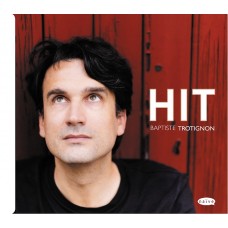您的購物車沒有添加專輯!
搜尋
巴普提斯‧特羅提農_熱門集 Baptiste Trotignon Hit
Because “hitting” as percussion, as the primary driving force of sound, the fundamental
element of so many musical forms, their organic element and life source, has always
been at the centre of most types of Afro-American music and all those derived from it. And
because my love for melody, which has always made me want to make the piano sing and use
it as a cantabile instrument, has never completely taken me away me from the pleasure of
physically hitting the keys, with all its instinctive, earthly connotations.
When the gesture of “hitting” is multiplied and organizes itself into a coherent
musical discourse, it generates an infi nite diversity of rhythms and playing modes, and it’s the
way you accentuate a given phrase or note or harmony that brings those rhythms to life. This
notion of accent has always fascinated me, and it’s exciting to hear how a parallel could be
drawn between a certain tradition of masters of accentuation in the jazz idiom (Bill Evans and
Lennie Tristano, for example, to mention only pianists) with some European composers for
whom the way one places accents is a joyful creative force in itself (I’m thinking of Beethoven,
Bartók, Ravel or Ligeti, among others). One of the dimensions of «Hit» is that the programme
has been conceived as a series of games around these accents, whether it’s in writing or improvising,
in voluble and brilliant moments or the most melodic and meditative ballads.
Recording an album of compositions exclusively for trio is a kind of homecoming
for me (I hadn’t done it for 13 years), with just the feeling that now was the right time to do
it. I’m sometimes asked whether it makes sense to continue to play in trio formation, which
historically has been overused by pianists, but I admit the question has never occurred to me,
and I’ve never doubted the unlimited resources of this triangular architecture, which is still a
source of shared pleasure and a potential for renewing the language. Would there be no point
in a solo artist singing along with his guitar on the grounds that “it’s already been done”?
As I often like to do, the music on this album is a mix of multiple sources of inspiration
( here almost a pop song, or a very Latin melody, elsewhere a colour learning more
towards world music or the music of the 70s) but remains lovingly connected to the foundations
of Afro-American music, driven by something joyous in its dynamism and a common
desire (for Thomas, Jeff and me) to remain playful, even when the sonic construction calls for a
certain sophistication. As the artist-philosopher said, what else are we doing but trying to «get
back to the serious way we used to play when we were children”?
Baptiste TROTIGNON
編號 |
曲目 |
長度 |
作詞 |
作曲 |
演奏 |
樂團 |
演唱 |
指揮 |
試聽 |
|---|


